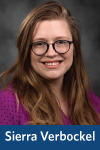I recommend all young professionals attend at least one PRIM&R Conference. As more professionals in our field from previous generations retire, we lose the ability to learn from them. This is especially true in higher education. Even in other departments across campus, I often hear of practices discontinued after someone’s retirement and no one else recognizing the necessity of it until a problem arises and it’s remembered again.
PRIM&R has become an ever-growing repository of knowledge for research ethics and compliance. Attending a conference provides access to a virtually unlimited amount of knowledge and resources. Not only will you feel overloaded with information, but with over 2,000 attendees at in-person events, you’re bound to develop networking connections (and friends)! Plus, as a young professional, the experience of attending a conference will refresh your passion for research ethics. Even if you’re a seasoned research ethics professional, the overwhelming support from the conference is enough to rejuvenate any burned-out soul.
A benefit of so much information being available is that there are opportunities to learn for everyone and every situation. I attended sessions tailored to small institutions, data and privacy, and various research topics seen at University of Wisconsin-Stevens Point (like social media and student research). While I may have only been able to physically attend a few sessions, I have post-conference access to materials from every session offered. This allows me to learn from nearly every session and obtain contact information for future connections, well beyond the end of the conference. Not only that, I can also use what I learned to tailor educational opportunities at my campus to fit the individual needs of our investigators. I shared the agenda with the IRB Chair, and she found several sessions that would be useful for her own continuing education. I plan to create learning sessions about research methods in exercise science, and facilitate learning opportunities for committee members during meetings, to name just a few.
As a small-town Midwesterner, I had the opportunity to meet IRB professionals from across the globe at the SBER and AER Conferences. My world back home began to feel incredibly small as I networked with professionals from Africa, China, and across the US. At the same time, I felt my career path strengthening by establishing connections with likeminded individuals nationally and internationally. The willingness to collaborate, share, and advise could easily be witnessed in each session, break, and lunch period. I would observe old friends and complete strangers trading war stories and tips to improve their practices, giving me ideas for my own program. I also established a few new relationships of my own that helped me understand the history of research ethics and IRB in higher education. Operating a single staff IRB program can feel very isolating. The connections and knowledge gained from attending the PRIM&R SBER/AER Conference reduced the isolation I felt and gave me hope for the future of research ethics at UWSP.
Sierra Verbockel, BS, MPA is the Grants and Research Associate at University of Wisconsin (UW)-Stevens Point. She has been working in research administration since 2017, beginning as a research compliance assistant at UW-Oshkosh. She also has experience in grants administration. As a former student of UW-Oshkosh, she developed an interest in research, eventually conducting her own research studies on differential association theory.
Sierra achieved her master’s degree in Public Administration with an emphasis in Nonprofit Management and Leadership in addition to a Baccalaureate degree in Human Services Leadership and Criminal Justice. Her research interests include community organization and development, employment-education mismatch, generational differences in the workplace, and emotional intelligence. Those interests carried into her career, where she works to make a difference in the lives of her colleagues as UWSP moves toward a more inclusive environment. She enjoys learning from those around her and creating new, more efficient ways of being successful-both as an individual person and as a member of the UWSP collective.
Members of PRIM&R’s Blog Squad and other guest contributors are valued members of our community willing to share their insights. The views expressed in their posts do not necessarily reflect those of PRIM&R or its employees.
Registration is now open for PRIM&R’s 2020 Advancing Ethical Research Conference (AER20), which will take place virtually. We will present AER20 as a series of shorter, half-day online events (with built-in opportunities for networking) spread out over three weeks in December (December 1-2, December 8-9, December 15-16).


No comments! Be the first commenter?